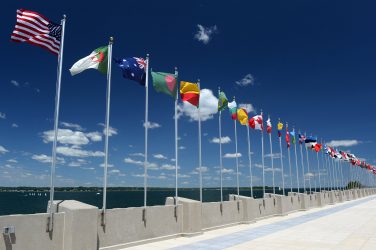E&M’s Nicoletta Enria sat down with award-winning author Marco Mancassola to chat about the importance of celebrating literature transnationally, and how the Festival of Italian Literature in London breaks stereotypes and brings issues prominent across Europe to the forefront.
E&M: Hello there, to begin with could you tell us a bit about yourself?
I am an author and festival organiser. Originally from a working-class family in the Veneto region, I get particularly irritated by all the idiotic clichés about “urban elites”. I live in London where with a group of fellow Italians – among them, authors Claudia Durastanti and Marco Magini – I run the Festival of Italian Literature in London (FILL).
E&M: How did the initiative of the festival come about?
We started thinking about it after the Brexit referendum. As members of the Italian community in London, the uncertainties of Brexit made us feel more vulnerable, but so did the increasing deterioration of democracy in our home country. We wanted to start a new event where literature – especially Italian literature – wasn’t confined to some abstract and dying status. We wanted to talk about novels and politics, poetry and migration, about languages and power, and how literature can deal with the turmoil in Italy and London and Europe. Being Italians in London gives us a specific perspective – I am not saying it is the most interesting, but it is our perspective and we’ve decided to use it to create FILL.

E&M: Why do you think this is an initiative that will attract much of an audience in London?
The first edition sold out and created a sense of community around the festival. This year we are back with an even stronger programme. FILL is run by a group of volunteers and can count on a network of supporters and advisers, and on a very motivated multilingual audience. I think FILL has a good balance between being a literary festival and a festival of ideas, and between a grass-roots project and a high-profile event. The line-up of FILL 2018 includes two Strega Prize winners, a Prix Goncourt and a Booker Prize, authors and thinkers from different backgrounds, and some very interesting new voices.
E&M: In an age of increasing nationalism, what do you think is the benefit of transnational approaches to literature?
Nationalist and populist leaders are convincing people to restrict their perspective – people in Italy have stopped talking about neighbouring countries or about anything else really, they just talk obsessively about some imaginary “invasion” of migrants ready to take over Italy. Voters are living in a world of complex and interconnected phenomena – think, for instance, of the connection between climate change and migration – but they are purposely induced to lose sight of the big picture. Nationalists thrive when people get short-sighted (while they, the nationalists, create international alliances like the one between Salvini, Orban, Le Pen, and other far-right leaders). Good literature acknowledges complexity and the interconnection of individual lives with history, society, or other forms of “bigger picture”. It can also be a place where different authors writing in different languages come face-to-face with the same issues and topics. Since the beginning we decided that FILL needed to be a place of cross-cultural dialogue and to bring together Italian and international voices.
Voters are living in a world of complex and interconnected phenomena – think, for instance, of the connection between climate change and migration – but they are purposely induced to lose sight of the big picture.
E&M: Indeed, many of the topics covered are very relevant current topics that affect both Italy, the UK and other European countries – do you find that people from other countries take part in the festival?
A big part of our audience is made up of London-based Italians, but we have plenty of British and international Londoners too. We are finding that certain topics in the programme of FILL 2018 resonate particularly with both the Italian and the non-Italian crowds – for instance the representation of black voices in literature and in the media, or how literature can seize the frantic present we live in. Other topics are centred around a more specifically Italian perspective, or else around a London perspective. For our session about the European novel, featuring authors Nicola Lagioia and Mathias Énard (who will be appearing for the first time in a public event in London) we expect a large French crowd too.
E&M: Why do you think a festival like this is important nowadays?
I think it is important on more than one level. It is important for the Italian community in London, who now have an annual literary festival and a new place for cultural debate, especially valuable in the current political mood. It is important for London, at a time when the European and international nature of this city is at risk. I guess the debates that take place at the festival sessions are interesting for people in Italy too – we have media partnerships with important Italian news organisations and quite a few people follow what we do from Italy.
E&M: What is the event you are most looking forward to and why?
“Detecting violence”, a talk with Lorenzo Pezzani from Forensic Oceanography, the cutting-edge research agency that investigates into the deaths of migrants in the Mediterranean. I also look forward to “Wretched Strangers”, a poetry performance with Italian-born and other foreign-born authors who live in the UK; I expect it to be a rather strong performance and to interact beautifully with the space of the theatre where it will take place. Also, “Italy. Europe. The age of nationalism?” will bring together three important voices (historian Donald Sassoon, philosopher Lorenzo Marsili, and filmmaker Annalisa Piras).
E&M: Anything left to tell E&M readers?
FILL is not an isolated experience – a few similar festivals are being created around the world and we are launching a network of Italian literary festivals outside Italy.
The festival will take place on 27-28 October at the Coronet Theatre in Notting Hill, for more information and to buy your tickets here is their website.









